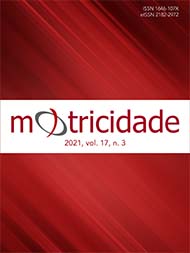Efeitos da reabilitação virtual no controle postural de indivíduos com doença de Parkinson
DOI:
https://doi.org/10.6063/motricidade.20207Palabras clave:
Doença de Parkinson, Equilíbrio Postural, Terapia de Exposição à Realidade Virtual, Jogos de VídeoResumen
A Doença de Parkinson (DP) causa um declínio progressivo das funções motoras e cognitivas, muitas vezes afetando o controle postural. O treinamento por meio de realidade virtual tem se mostrado eficaz na melhoria dessa condição. Este estudo teve como objetivo analisar os efeitos dos Jogos Kinect Adventures no controle postural de pessoas com DP. Foram selecionados dez indivíduos com diagnóstico de DP idiopática, nos estágios I a III da escala de Hoehn & Yahr, com idades entre 48 e 73 anos. Foram realizadas 14 sessões de treinamento de uma hora cada, duas vezes por semana. Os indivíduos foram avaliados pré, pós-intervenção e 30 dias após a última sessão de intervenção. A avaliação foi realizada por meio de uma plataforma de força que mediu a área de oscilação (COP), a velocidade do centro de pressão (VOS) e os Limites de Estabilidade (LOS) em dez diferentes condições sensoriais. Não houve alterações significativas na COP e na VOS imediatamente após a intervenção nem nos 30 dias após o término do treinamento. Os LOS apresentaram um aumento estatisticamente significativo imediatamente apenas após o treinamento nas 14 sessões. Os resultados deste estudo indicam que o treinamento com os Jogos Kinect Adventures melhora o controle postural de pessoas com DP promovendo aumento dos LOS.
Palavras-chave: Doença de Parkinson, Equilíbrio Postural, Terapia de Exposição à Realidade Virtual, Jogos de Vídeo
Descargas
Publicado
Número
Sección
Licencia
The authors of submitted manuscripts must transfer the full copyright to Journal Motricidade / Sílabas Didáticas Editions. Granting copyright permission allows the publication and dissemination of the article in printed or electronic formats, and copyrights start at the moment the manuscript is accepted for publication. It also allows Journal Motricidade to use and commercialise the article in terms of licensing, lending or selling its content to indexation/abstracts databases and other entities.
According to the terms of the Creative Commons licence, authors may reproduce a reasonable number of copies for personal or professional purposes, but without any economic gain. SHERPA/RoMEO allows authors to post a final digital copy (post-printing version) of the article on their websites or on their institutions' scientific repository.


